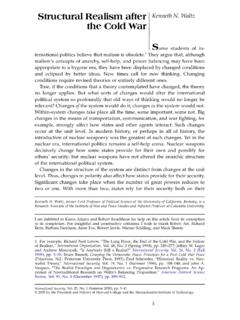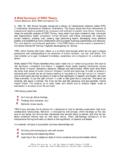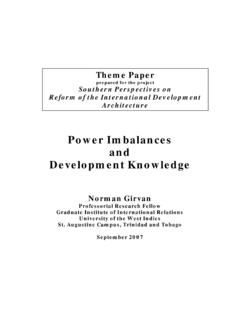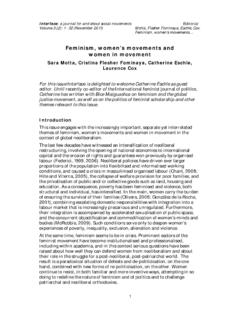Transcription of Do Alliances Deter Aggression? The Influence of Military ...
1 Do Alliances Deter Aggression? The Influence ofMilitary Alliances on the initiation of MilitarizedInterstate DisputesBrett Ashley LeedsRice UniversityScholars have long debated the effects of Military Alliances on the likelihood of war, and no clear support has emerged forthe argument that Alliances improve the prospects for peace through effective deterrence nor that they kindle the flamesof war. In this study, I argue that alliance commitments affect the probability that a potential challenger will initiate amilitarized interstate dispute because Alliances provide information about the likelihood that others will intervene in apotential conflict.
2 Yet, different agreements provide different information. alliance commitments that would require alliesto intervene on behalf of potential target states reduce the probability that a militarized dispute will emerge, but alliancecommitments promising offensive support to a potential challenger and Alliances that promise nonintervention by outsidepowers increase the likelihood that a challenger will initiate a crisis. As diplomats have long understood, the specific contentof international agreements helps to determine their Two Faces of Alliances :Deterrence and AssuranceDo Alliances lead to peace or to war?
3 Despite the fact thatmilitary Alliances have long been considered a key fac-tor in international politics, this basic question remainslargely unanswered. Scholars disagree both on the extentof the independent influence of Alliances on behavior andon the direction of that influence. While some claim thatthe careful use of Military Alliances to create countervail-ing coalitions will Deter aggressors and prevent war ( ,Gulick, 1955; Morgenthau 1967; Waltz 1979), others claimthat alliance commitments can serve to provoke and toexpand war ( , Christensen and Snyder 1990; Siversonand Starr 1991; Vasquez 1993).
4 Large N empirical tests ofthe relationships between Alliances and war have not clar-ified the debate, as they have failed to produce clear andconsistent findings. Based partially on the lack of a clearand consistent empirical relationship, some scholars haveBrett Ashley Leeds is Assistant Professor of Political Science, Rice University, Box 1892 MS 24, Houston, TX research was supported by the National Science Foundation (grant # SES-0095983). Earlier versions of this research were presentedat the 2001 Annual Meeting of the Peace Science Society, the 2001 Annual Meeting of the American Political Science Association, the2001 Annual Meeting of the Midwest Political Science Association, and at workshops at The Ohio State University, University of Chicago,Emory University, Rice University, and Texas A&M University.
5 The author thanks workshop participants, Andrew Long, Sara Mitchell, WillMoore, Cliff Morgan, Michael Simon, Randy Stevenson, Lora Viola, and Suzanne Werner for helpful comments on this research. Data forreplication can be downloaded from that Alliances have no discernible effect on theprobability of international this article, I suggest that the simple question, Doalliances lead to peace or to war? is ill posed becausethe termalliancerepresents a heterogeneous category ofcooperative security agreements that may have differingeffects on the probability of conflict.
6 I argue that militaryalliances do affect the probability of militarized conflict,but that this impact has been clouded in previous empir-ical research by the failure to account for differences intreaty content. Because some Alliances serve to Deter ag-gression while others encourage it, relationships betweenalliances and Military conflict have been masked in aggre-gate on theoretical models developed by Morrow(1994), Smith (1995, 1998), and Fearon (1997), I arguethat formal Military alliance agreements provide informa-tion to state leaders about the likelihood of interventionby other states in potential conflicts.
7 Because alliancesAmerican Journal of Political Science,Vol. 47, No. 3, July 2003, Pp. 427 439C 2003 by the Midwest Political Science AssociationISSN 0092-5853427428 BRETT ASHLEY LEEDS help state leaders to predict which conflicts will remainbilateral and which are likely to become multilateral, theyaffect the willingness of leaders to initiate particular mili-tarized disputes . I extend the work of Morrow, Smith, andFearon both theoretically and empirically. Theoretically,I extend the argument to include hypotheses about thetype of information provided in alliance agreements andthe subsequent effects that Alliances including differentpromises are likely to have on the decisions of state lead-ers to initiate militarized conflict.
8 This allows me to de-velop a more general theory of the influences of allianceson war. Empirically, I employ a new dataset on alliancecommitments to conduct a statistical analysis that sup-ports this theory and also fills a void in the literature ondeterrence by addressing the extended general deterrentproperties of formal alliance commitments. While schol-ars have attempted to determine the effects of allianceson extended immediate deterrence, the extended generaldeterrent effect of Alliances remains largely unexamined(Huth 1999).
9 alliance commitments affect decisions to initiate dis-putes, but because different Alliances involve differentpromises to different actors, Alliances can have differ-ent effects. Some Alliances Deter open hostilities whereasothers provide the assurances necessary to facilitate at-tack. This study offers additional support for the efficacyof international agreements; Alliances do affect behaviorand they can play an effective role in general study also focuses attention on the varying effects oftreaties with different provisions; the specific content oftreaties matters in addition to their existence.
10 Togetherthese lessons should aid policymakers in anticipating thepossible effects of Military Alliances and should encouragescholars to pursue research on Military Alliances , but tobe wary of generalizing the effects of treaties with Should Alliances AffectDispute initiation ?The puzzle facing theorists of alliance politics centers onthe question of why leaders formalize cooperative rela-tionships in contracts ( , Morrow 2000). It is possibleto cooperate without a formal agreement, so why do stateleaders commit to contracts, particularly if contracts in in-ternational politics are unenforceable?








